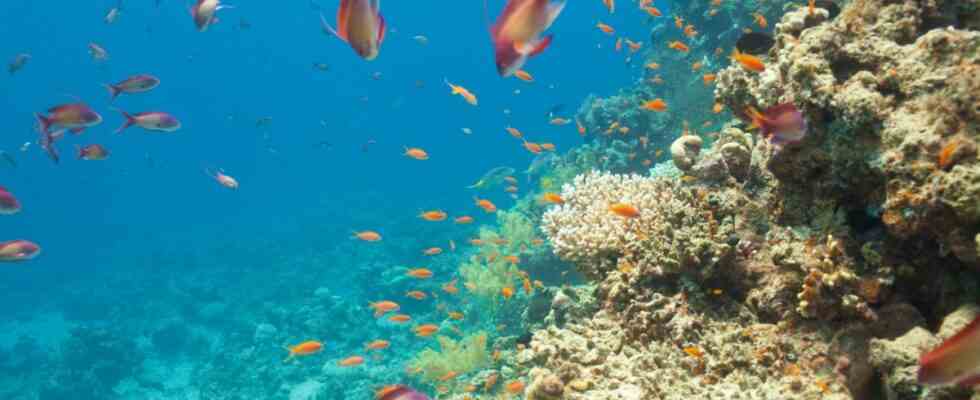The negotiators at the climate summit in Egypt would not have to look far for the treasures of nature. On the beaches of Sharm el-Sheikh, after a few hundred meters, the sea plunges into a world of thousands of fish, colorful plants and corals. Those corals that – just for example – are in danger of falling victim to ocean warming.
Because the climate crisis also threatens animal and plant species, and conversely, nature conservation often also serves to protect the climate. The goals of the Paris climate agreement, says Germany’s Environment Minister Steffi Lemke (Greens), “can only be achieved with intact ecosystems”.
The opportunity to think both together is more favorable than ever. Not only is the international community currently negotiating in Sharm el-Sheikh on joint climate protection. In three weeks, the World Conservation Conference will begin in Montreal, Canada. It should bring a breakthrough like the Paris climate summit. But Sharm el-Sheikh also shows that the connection between the two projects is not as easy as it might seem.
“At this climate conference we have to build a bridge to the biodiversity conference”
Lemke traveled to Egypt specifically to establish this connection. “At this climate conference, we have to build a bridge to the biodiversity conference,” she says. The key should be climate solutions based on nature, in conference talk “nature based solutions”.
This includes a lot: the protection of the seas, for example, which absorb a lot of carbon, as well as forests. Sustainable agriculture that also protects soil, or the protection of moors and floodplains. It is often about reversing human intervention and giving space back to nature. But sometimes nature also helps to mitigate the effects of climate change. For example, when restored mangrove forests protect coastal strips. And this usually creates new spaces for animals and plants.
Lemke invited to a press conference at the climate conference, and Elizabeth Maruma Mrema, head of the UN Secretariat for the Convention on Biological Diversity, is also there. It prepares the conference in Montreal. Mrema would also like to hit a few pegs in Egypt for her summit in three weeks. “If we say that both crises are linked, then the outcome of this conference here has a direct impact on the December conference,” she says. A “strong message” is needed in Sharm el-Sheikh.
So far, however, little has been seen of this. Last year, at the climate conference in Glasgow, the states merely “recognized” the connection between the two crises – they were not much more specific in their final declaration at the time. That was “unfortunate,” says Lemke. But this year, things could end in a similar way. There is still resistance.
Brazil, for example, for which the people in Jair Bolsonaro’s ousted government are still negotiating, has so far rejected the purchase – also for fear of new paternalism when it comes to the Amazon rainforest. After all, the newly elected new President Lula da Silva is now announcing an about-face in climate policy, and that on Wednesday directly at the climate conference. Even the G77 group of developing countries, to which China belongs, expresses reservations; she doesn’t want to mix up the two issues. And Bolivia, which with a very spiritual approach makes “Mother Earth” and her well-being the benchmark for all climate policy, rejects the natural solutions – it sees them as a new instrument with which rich countries want to export their solutions all over the world.
Not everything that serves the climate also protects nature
Especially since much of what protects nature serves the climate – but the reverse is not necessarily true. The Philippine human rights activist also attended Lemke’s press conference in Sharm el-Sheikh Joan Carling part, which campaigns for the rights of indigenous peoples. Indigenous people are also losing their homes in the name of climate protection and nature conservation. For example, because rare minerals are to be excavated there for the energy transition, or because they are being expelled from newly created national parks.
“People are being killed in the name of climate protection,” warns Carling. “We need to end silo thinking.” Which in turn would speak in favor of giving nature and its protection due space at the climate conference.
It is “amazing” that this is not the case, says Jörg-Andreas Krüger, head of the nature conservation association Nabu. “Without healthy ecosystems, the climate catastrophe cannot be averted.” The Chancellor would have to travel to Montreal in person to give the conference there more weight.
Instead, Germany is launching a new initiative on Wednesday, which is intended to better coordinate global efforts related to natural solutions. The initiative’s partner is none other than the host country Egypt, which also presides over the climate summit. Because which bridge the conference builds to Montreal at the end is largely in his hands.

